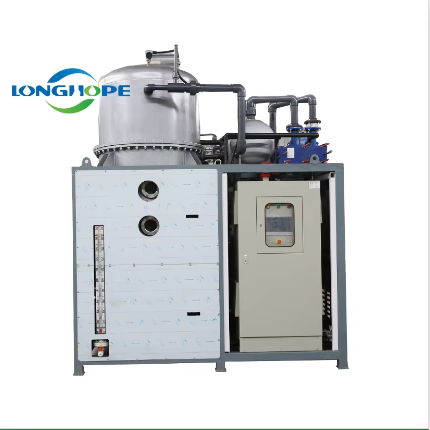Unlocking Productivity Through Advanced Liquid Concentration Methods
Businesses across manufacturing today keep looking for better ways to cut down on waste while improving what they produce. Vacuum evaporators have become really important tools in several different industries over recent years. These systems work at lower temperatures to evaporate liquids, which makes them super efficient for certain applications. Think food processing or pharmaceuticals where getting just the right mix of ingredients matters a lot. The ability to separate and concentrate substances without high heat saves money and maintains product integrity, something manufacturers can't afford to ignore when margins are tight.
Principles Behind Vacuum Evaporation
Low-Pressure, Low-Temperature Operation
At the heart of vacuum evaporator technology is the principle that liquids boil at lower temperatures when the surrounding pressure is reduced. This allows for energy-efficient evaporation without subjecting materials to high heat, preserving their quality and reducing thermal degradation.
Phase Separation for Purity and Recovery
The process involves heating a liquid under reduced pressure so that the volatile components (often water or solvents) evaporate, leaving behind concentrated residues. The vapor is then condensed and collected separately, allowing for both recovery and purification in one cycle.
Industrial Applications of Vacuum Evaporators
Wastewater Treatment and Effluent Management
In metal finishing, chemical processing, and electronics manufacturing, vacuum evaporators are widely used for treating industrial wastewater. By reducing the volume of liquid waste and concentrating contaminants, these systems make disposal easier and less expensive while recovering valuable resources.
Food and Beverage Concentration
Vacuum evaporators are essential in the production of juices, dairy products, and flavor extracts. They help preserve the natural taste and nutrients of food by evaporating water at low temperatures, minimizing the risk of thermal damage.
Pharmaceutical and Chemical Processes
In pharmaceutical manufacturing, where maintaining purity is critical, vacuum evaporation provides a controlled method to concentrate active ingredients or recover solvents. Its gentle processing ensures the integrity of sensitive compounds during production.
Key Advantages in Industrial Use
Significant Energy Savings
Since vacuum evaporators operate at lower temperatures, they consume less energy than conventional thermal evaporators. This energy efficiency translates into reduced operational costs and improved sustainability metrics.
Compact and Scalable Designs
Modern vacuum evaporators are available in modular formats, making them easy to scale up or down depending on production needs. This flexibility supports both small-batch operations and large-scale industrial processes.
High Product Quality and Safety
By minimizing exposure to high heat, vacuum evaporator technology ensures that delicate substances retain their quality and chemical structure. This is particularly important in the food, beverage, and pharmaceutical sectors.

Choosing the Right Vacuum Evaporator System
Single-Effect vs. Multi-Effect Evaporators
Single-effect systems are suitable for small-scale applications and lower concentrations, whereas multi-effect evaporators are more energy-efficient and better suited for high-volume operations. Multi-effect setups reuse vapor heat from one stage to drive the next, reducing energy consumption significantly.
Consideration of Material Compatibility
The design and materials used in vacuum evaporators must be compatible with the substances being processed. For example, highly corrosive liquids may require specialized stainless steel or coated surfaces to prevent damage and contamination.
Automation and Control Features
Advanced vacuum evaporators come equipped with digital control panels and automated sensors, ensuring precise monitoring of temperature, pressure, and concentration levels. These features help reduce manual intervention and minimize errors during operation.
Environmental and Regulatory Benefits
Reduced Waste and Emissions
By concentrating waste streams and separating reusable water or solvents, vacuum evaporators support zero-liquid discharge (ZLD) initiatives. This reduces the environmental footprint of industrial facilities and aligns with regulatory goals on waste minimization.
Easier Compliance with Discharge Limits
Industries facing strict regulations on effluent discharge can use vacuum evaporation to lower pollutant concentrations, making compliance with environmental standards more attainable without relying solely on chemical treatment.
Future Trends in Vacuum Evaporation
Integration with Renewable Energy Sources
Some systems are being paired with solar thermal energy or waste heat recovery units to further reduce carbon emissions. This integration helps create more sustainable manufacturing environments while lowering operational costs.
Smarter Evaporation Systems
With the rise of Industry 4.0, vacuum evaporators are becoming more intelligent. Real-time data collection, predictive maintenance, and AI-based process optimization are gradually being incorporated into system designs to enhance performance and reduce downtime.
Maintenance and Operational Best Practices
Routine Cleaning and Descaling
Over time, residues can build up on the internal surfaces of evaporators, affecting heat transfer and efficiency. Scheduled cleaning with appropriate solutions helps maintain consistent performance and extends equipment lifespan.
Monitoring Vacuum Integrity
Leaks in the vacuum system can reduce evaporation efficiency and increase energy consumption. Routine checks of seals, valves, and pressure levels are essential for sustained operational reliability.
Staff Training and System Calibration
Operators should be trained to understand system parameters and respond to alarms or anomalies. Periodic calibration of sensors and control systems ensures that the evaporator performs within optimal ranges.
FAQ
What makes vacuum evaporation more efficient than traditional evaporation methods?
Vacuum evaporation requires less heat to boil liquids by operating under reduced pressure. This makes the process more energy-efficient and suitable for temperature-sensitive substances.
Is vacuum evaporator technology suitable for small businesses?
Yes. Compact and modular systems are available for small-scale applications, making the technology accessible to laboratories, boutique food producers, and niche manufacturers.
Can vacuum evaporators help recycle water?
Absolutely. One of the primary advantages is the ability to recover clean water from industrial waste streams, making it reusable and reducing freshwater consumption.
How long does a vacuum evaporator typically last?
With proper maintenance and correct usage, vacuum evaporators can last over a decade. High-quality components and regular upkeep are key factors influencing longevity.
Table of Contents
- Unlocking Productivity Through Advanced Liquid Concentration Methods
- Principles Behind Vacuum Evaporation
- Industrial Applications of Vacuum Evaporators
- Key Advantages in Industrial Use
- Choosing the Right Vacuum Evaporator System
- Environmental and Regulatory Benefits
- Future Trends in Vacuum Evaporation
- Maintenance and Operational Best Practices
- FAQ

